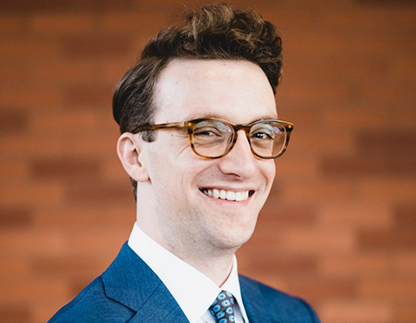Make friends with the authors that impress or intrigue you; they will be happy to hear from you.”
Austin Jenkins (he/him)
PhD Candidate & Graduate Student Coordinator for the Science in Human Culture Doctoral Colloquium in the Department of Sociology

Austin Jenkins is a PhD candidate and graduate student coordinator for the Science in Human Culture Doctoral Colloquium in the Department of Sociology in the Weinberg College of Arts and Sciences. He studies how law and scientific expertise shape each other by examining the history of addiction research, drug and alcohol policy, and immigration law. Austin was awarded a Mellon cluster fellowship in Science in Human Culture and an interdisciplinary graduate assistantship from the Center for Legal Studies.
How would you describe your research and/or work to a non-academic audience?
The contemporary American addiction treatment system involves remarkably few medical professionals and often relies on the coercive force of legal institutions to get people into treatment and keep them there, though research has shown that such coercion is not effective in helping people achieve long-term abstinence. My work helps explain how and why these peculiar features of the American addiction treatment system emerged by examining a series of reform movements in Minnesota, beginning with the building of the Minnesota Inebriate Asylum (an insane asylum for drunkards) in the 1870s and ending with the rise of Hazelden and its influential "Minnesota Model" of addiction recovery in the 1970s.
What have been some of the most memorable twists and turns of your career?
I am a sociologist because I read Joshua Page's The Toughest Beat after seeing it in a book display at the Los Angeles Central Library. I later worked as a recent assistant for Josh, helping him organize and think through his research on the American bail bonds industry. Getting an insider's view of his research process was an invaluable opportunity—and fun!
Tell us what inspired your research and/or work.
I came to sociology from psychology. I wanted to understand whether mental disorders exist independently of culture, with time and place merely shaping whether we notice them and how we understand them, or whether mental disorders are instead inseparably "bound" to certain cultures. I then became interested in criminal justice after reading the work of scholars like Joshua Page, Michelle Alexander, and Loïc Wacquant. Reading Richard DeGrandpre's The Cult of Pharmacology and Bruce K. Alexander's The Globalization of Addiction alerted me to the importance of historical factors in shaping intoxication and substance use disorders, and Teresa Gowan and Sarah Whetstone's work encouraged me to join my longtime interest in addiction with the sociology of law.
Whom do you admire in your field and otherwise, and why?
Khaldoun Samman, the late Mahnaz Kousha, Teresa Gowan, Michelle Phelps, and Joshua Page fostered my love of sociology and were very kind to me during a time in my life in when I needed a lot of help. I would love to do the same for my students. Steven Epstein and Monica Prasad taught me that learning to appreciate good scholarship on a deep level is both more difficult and more valuable than learning how to find the flaws in an argument. Jacqueline Stevens is brilliant, principled, and an unparalleled mentor.
What is the biggest potential impact or implication of your work?
My research shows that struggles over what addiction "is" tend to obscure the most vexing and important problems of drug and alcohol policy, which are epistemological, political, and ethical rather than ontological in nature. How should we determine who needs treatment and who does not? Who possesses the expertise necessary to make such determinations well? When is it just for the government to use force to make people live a certain way? No understanding of the etiology or underlying biological mechanisms of addiction, no matter how sophisticated or accurate, can answer these questions. Perhaps our discussions about drug and alcohol policy reform, not to mention our government's research funding priorities, ought to take greater notice of these issues.
Why Northwestern?
Northwestern is rightly considered a world leader in qualitative sociological research. I have also learned an enormous amount from professors outside of the Department of Sociology, including Penelope Deutscher, Alessia Ricciardi, Rebecca Seligman, Helen Tilley, and Jacqueline Stevens. Northwestern's administrative staffers are also kind and enormously helpful.
What books are on your bedside table?
Buzz Aldrin's Return to Earth, Amitav Ghosh's Sea of Poppies, and Leo Tolstoy’s Anna Karenina.
What did you originally want to be when you grew up?
I wanted to be a writer. Now I want to be a writer with job security and health insurance, which is to say, a professor.
What advice would you give your younger self or someone considering a similar path?
Start with a problem and then read everything you can about it. Make friends with the authors that impress or intrigue you; they will be happy to hear from you. If you do this for a few years and feel that all you have accomplished is understanding that the problem is more complex than you had ever imagined, you're on the right track.
Published: December 20, 2022
If you know a graduate student, postdoctoral trainee, graduate faculty member, staff member, or a member of our TGS alumni population who would make a great candidate for our TGS Spotlight Series, please complete this brief TGS Spotlight Series Nomination Form.